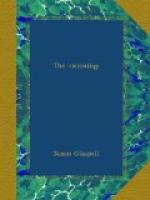It was only his eyes which answered, but the fullness of the response ushered them into a silence in which they rested together understandingly.
“I sat there watching the house,” he went back to it after the moment. “I was sure the girl would come out again. ‘She’ll bungle it,’ I said to myself. ‘She’ll never be able to put it through.’ But time passed—and she did not come out!”—inconsistently enough that came with a ring of triumph. “And then the next day—after the wonder had grown and grown—I saw her driving with you. I was just off the head of the Island. She was turned toward me, looking up the river. Again I saw her eyes, and in them that time I read you. And I don’t believe,” he concluded with a little laugh, “that my stock of hate can ever be quite so secure again.”
They talked on, not conscious that it was growing late. Time and place, and the conventions of time and place, seemed outside. She let him in quite freely: to that edge of fun and excitement as well as to the strange and somber places. It was fun sharing fun with him; and something in his way of receiving it suggested that he had been in need of sharing some one’s fun. He had a way of looking at her when she laughed that had vague suggestion of something not far from gratitude.
But the fun light, and that other light which seemed wanting to thank her for something, went from his eyes, leaving a glimmer of something deeper as he asked: “But you’ve never asked for her story? You’ve demanded nothing?”
“Why no,” said Katie; “only that I should be proud if she ever felt I could help.”
He turned his face a little away. One looking into it then would not have given much for his stock of hate.
Worth had approached. “Ain’t you getting awful hungry, Aunt Kate?”
It recalled her, and to embarrassment. “We must go at once,” she said, confused.
“Did you find out all you wanted to know from him, Aunt Kate?” he asked, getting in the boat.
She transcended her embarrassment. “No, Worth. Only that there is a very great deal I would like to know.”
He was standing ready to push her boat away. She did not give the word. As she looked at him she had a fancy that she was leaving him in a lonely place—she who was going back to what he called the sunny paths. And not only did she feel that he was lonely, but she felt curiously lonely herself, sitting there waiting to tell him to push her away. She wanted to say, “Come and see me,” but she was too bound by the things to which she was returning to put it in the language of those things. And so she said, and the new shyness brought its own sweetness:
“You tell me to come to you if I need a guide. Thank you for that. I shall remember. And perhaps sunshine is a thing that soaks in and can be stored up, and given out again. If it ever seems I can be of any use—in any way—will you come where you know you can find me?”




